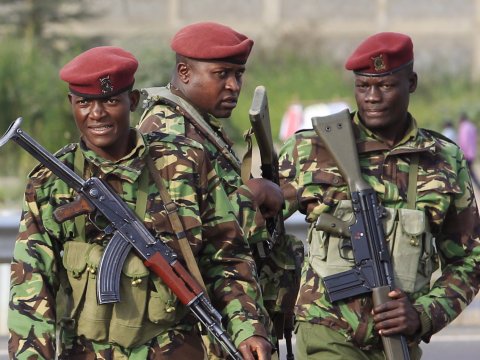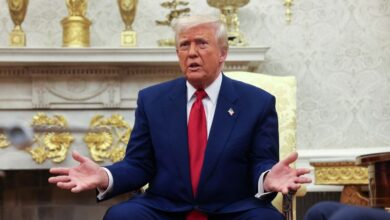
An estimated 180,000 police officers and members of the security forces have been deployed across Kenya as the country prepares to vote on Tuesday in a fiercely contested presidential election.
Voters will either return the incumbent, Uhuru Kenyatta, in power since 2013, or elect the veteran opposition politician Raila Odinga. Recent opinion polls have not indicated any clear leader in the campaign and turnout will be a key factor.
The country is braced for widespread unrest whoever wins, after a campaign marred by hundreds of violent incidents – including the murder of a high-profile election official – issues with new voting technology and widespread concerns about fraud.
A contested poll in 2007 led to more than 1,000 deaths, and violence could sweep the country again if the losing party refuses to accept the result.
At a church service near his home in Nairobi on Sunday, Kenyatta, 55, called for calm. “Do not allow anything to drive a wedge between you. You have been good neighbours and I urge you to remain so regardless of your tribe, religion or political affiliation,” the president said.
A Kenyan election officer in Nairobi prepares ballot boxes before they are transported to different polling stations.
Facebook Twitter Pinterest
A Kenyan election officer in Nairobi prepares ballot boxes before they are transported to different polling stations. Photograph: Baz Ratner/Reuters
Thousands of city dwellers have been returning to their home towns to vote or to wait out the aftermath of the poll in relative safety or both. Others have been stocking up on provisions in case of trouble. Upmarket supermarkets in central Nairobi were packed on Monday, though many streets have emptied and business has slowed.
“I am buying everything I need for my family for many days. You cannot be too sure, and we are a little bit frightened,” said Rose Maina, a housewife as she loaded flour, cooking oil and soft drinks into a trolley in the Kilimani neighbourhood.
Human rights officials, community leaders and politicians have called on voters to “control their emotions and preserve a peaceful environment” when the results are announced.
“If your candidate wins, do not rub other people’s noses in it, and if your candidate loses, suffer stoically and do not let Kenya down … We must hope for the best but be prepared for the worst,” said Kagwiria Mbogori, the chair of the Kenyan National Commission on Human Rights.
Quick Guide
Issues in the Kenyan election
Show
Local elections for appointments as governors, members of the lower house, senators, county officials and women’s representatives involve 16,000 candidates and are seen as potential flashpoints.
In Mathare, a poor area of Nairobi, several people were wounded and a child killed on Friday as rival supporters clashed with machetes and guns.
Alphonse Were, a mediator in Mathare working with young people, said there was “a section of people” who would not accept their candidate’s defeat in the elections and “believe that they will be forced to fight for justice”.
“As a peacebuilder, I am worried … It is the youth who cause the chaos, but the youth are controlled by the politicians for just 200 shillings (£1.50),” Were said.
About 19 million voters, half of whom are under 35, have been registered. Prisoners are able to vote for the first time.
Uhuru Kenyatta greets the crowd after attending church.
Facebook Twitter Pinterest
Uhuru Kenyatta greets the crowd after attending church. Photograph: Tony Karumba/AFP/Getty
Political allegiance in Kenya often reflects ethnic identity. Kenyatta’s Jubilee Alliance is largely supported by the larger Kikuyu and Kalenjin tribes, while Odinga has a following among the country’s smaller communities, such as the Luo.
Advertisement
In Mathare, Luo live in one neighbourhood with Kikuyu dominating an adjacent block of ramshackle tenements and tin roofed shacks. If Odinga loses the poll, “people will fight, because the election will have been stolen”, said Brian Aswani, a 22-year-old aspirant actor who is Luo.
Robert Gachie, a Kikuyu supporter of Kenyatta, said that he believed in “peace, peace, peace” but that many others in Machare did not.
Many Kenyans downplay ethnic factors, pointing instead to issues such as rising prices of staple foodstuffs, allegations of corruption and high unemployment.
“It is not about tribes. It is about corruption,” said Paul Ouma, manager of a bus company, who indicated he would be voting for Odinga. “Bread costs the same whichever tribe you are from. This government is not delivering development to the ordinary man and woman. They are heartless people.”
At the church in a middle-class neighbourhood of eastern Nairobi where Kenyatta prayed on Sunday, worshippers said tribal differences were minor.
“We sing here in all the languages of our country. Our pastor has been telling us there will be peace so we are not worried,” said Daniel Mwangi, a church official.
Raila Odinga at a rally on Saturday.
Facebook Twitter Pinterest
Raila Odinga at a rally on Saturday. Photograph: Dai Kurokawa/EPA
Observers see the election as the last showdown of a dynastic rivalry between the families of Kenyatta, 55, and Odinga, 72, that has lasted more than half a century.
Odinga is making his fourth attempt to gain power. He claims that elections in 2007 and 2013 were stolen from him.
Kenyatta would be constitutionally barred from a third term if victorious this time while Odinga would be prevented by age and previous failures from mounting a further challenge in 2022.
“It is the beginning of the end of an era and so it has to be painful and brutal,” said the commentator Charles Onyango-Obbo. “In part because Kenya has escaped the worst of African coups and wars it has never made the transition from a post-independence leadership. We are approaching a turning point.”
Nic Cheeseman, a professor of African politics at Birmingham University, said both candidates were so certain of victory that they may have “talked themselves into a corner” in which defeat is not an option.
“The question is not whether or not they will accept the result but what they will do when they don’t accept it,” he told Agence France-Presse.
A new biometric system of voter identification and counting was introduced after the 2007 election but partially failed in 2013.
Odinga claimed there was vote rigging, however he took his complaints to the courts instead of the streets and, despite some rioting after he lost his case, the process ended peacefully.
A Kenyan voter checks for her name on lists at a polling station in Nairobi.
Facebook Twitter Pinterest
A Kenyan voter checks for her name on lists at a polling station in Nairobi. Photograph: Daniel Irungu/EPA
Fears surrounding the system were raised last week when the election commission’s chief IT manager, Chris Msando, was found strangled and tortured in a forest on the outskirts of Nairobi.
Msando, a high-profile figure who had made frequent media appearances, had access to all the system’s passwords and secret codes.
Last week it was revealed that patchy mobile phone coverage meant around a quarter of machines would not be able to relay crucial information in real time.
Observers say preventing unrest after the poll depends on disappointed voters being confident there has been no vote rigging.
Mbogori encouraged Kenyans to perform their civic duty to choose their leaders. “We look forward to the day when elections in Kenya are not the reason for fear and uncertainty,” she said.



